5 Ex-Obama Officials Join Push for Stronger Iran Deal

A group of prominent American security advisers, including five with ties to President Barrack Obama’s first term, warned on Wednesday that a deal on curbing Iran’s nuclear program was at risk of failing to provide adequate safeguards.
In an open letter, the group of former U.S. officials and foreign policy experts cautioned that an Iran nuclear deal would “fall short of meeting the administration’s own standard of a ‘good’ agreement” unless it included a tougher line on United Nations nuclear inspections and conditions for sanctions relief.
The release of the letter, which was signed by Dennis Ross, an adviser on Iran and the Middle East in Obama’s first term, comes as U.S. Secretary of State John Kerry prepares to fly to Vienna on Friday to join the talks.
Ross told Reuters it was vital that negotiations were not driven by a deadline but by “getting it right.”
“The Iranians must understand that we will catch them if they cheat and that the price will be high even for lesser transgressions,” Ross said. “And, they must know that we will not permit them to have a weapons capability.”
Ross said administration officials with whom he had spoken said the principles outlined in the letter were contained in an April 2 interim agreement between Iran and world powers in Lausanne, Switzerland.
A senior U.S. official said the letter “in large part tracks with the U.S. negotiating positions inside the room.”
Negotiations between Iran and six major powers – the United States, Britain, Germany, Russia, China and France – are aimed at reaching an agreement by June 30 under which Tehran would curtail its nuclear program in exchange for sanctions relief.
Negotiations are widely expected to slide past a self-imposed June 30 deadline.
“Most of us would have preferred a stronger agreement,” the letter released by the Washington Institute said. “The agreement will not prevent Iran from having a nuclear weapons capability. It will not require the dismantling of Iran’s nuclear infrastructure. It will, however, reduce that infrastructure for the next 10 to 15 years.”
In addition to Ross, the letter was signed by David Petraeus, former CIA director and U.S. commander in Iraq, Robert Einhorn, a former member of the U.S. negotiating team with Iran, retired U.S. General James Cartwright and Gary Samore, an Obama adviser on nuclear policy turned president of the advocacy group United Against Nuclear Iran.
The letter was also signed by Stephen Hadley, a national security adviser to both former President George W. Bush and his brother, Republican presidential contender Jeb Bush.
Any deal would face fierce opposition from Republicans who have argued the Obama administration is readying a deal that would leave Iran with a clear path to making a nuclear weapon.
Kerry, speaking to reporters on Wednesday evening, said it was too early to say if negotiators could clear the last outstanding issues.
“If they are not addressed, there will not be a deal,” he said. “We have been very clear that we are not going to negotiate in public.”
A message from our Publisher & CEO Rachel Fishman Feddersen

I hope you appreciated this article. Before you go, I’d like to ask you to please support the Forward’s award-winning, nonprofit journalism so that we can be prepared for whatever news 2025 brings.
At a time when other newsrooms are closing or cutting back, the Forward has removed its paywall and invested additional resources to report on the ground from Israel and around the U.S. on the impact of the war, rising antisemitism and polarized discourse.
Readers like you make it all possible. Support our work by becoming a Forward Member and connect with our journalism and your community.
— Rachel Fishman Feddersen, Publisher and CEO





















